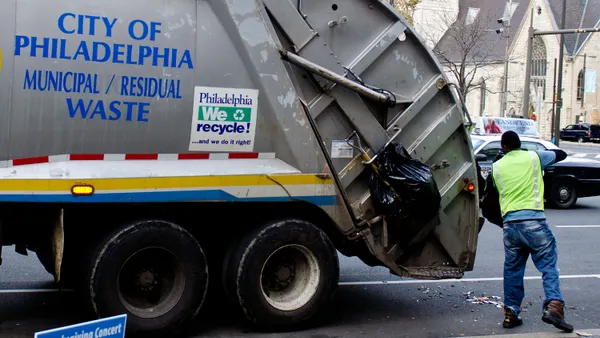Q1 Earnings
| Revenue | $1.35B |
| YoY Change | 8.7%▲ |
| Net Income | $143M |
Waste Connections reported the coronavirus pandemic shaved $12 million in revenue off what was otherwise on track to be a strong first-quarter earnings report. While effects have been particularly heavy for business in the Northeastern United States and Canada, and volumes have seen a notable decline, executives were cautiously optimistic.
"Any economic recovery should reduce this impact going forward and our daily trackers suggest that the worst may in fact be behind us," said CEO Worthing Jackman in prepared remarks during this morning's earnings call. "New business tracked in competitive markets outweighed losses earlier this week, increases outweighed decreases and net new business turned positive again."
COVID-19 effects
- Landfill tonnage was down 1% in March, showing the early effects of economic shutdowns, but commercial volumes were actually up in Western states for Q1. Overall volumes were down around 12% for April, ranging from 6-8% in certain areas to 30-50% in harder hit regions. April revenue was down 6% year-over-year (only 1.4% excluding the Northeast and Canada) and solid waste revenue was down 6.9%.
- Other companies have called out operational and financial effects from double-digit upticks in residential volumes, but Waste Connections did not focus on this during the call. In response to one analyst's question, Jackman said the company would be factoring these changes into future rate discussions for its many franchise contracts.
- In early signs that declines may be reversing, Waste Connections reported late April volume increases for solid waste landfills and roll-off business across 70% of its areas. The company also said about 12% of commercial customers that suspended or reduced service due to the pandemic have since been in contact to resume or increase their service levels.
Like Waste Management and Republic Services before it, Waste Connections experienced a dramatic shift in its business within a matter of weeks. Serious planning for potential effects reportedly began in February, with initial impacts hitting the business in March and ramping up into April across many parts of North America.
As previewed earlier this week, effects were particularly tough in the New York epicenter and layoffs have occurred. Commercial service reductions in the city were reportedly four times higher than the national average. Business in the broader Northeast (which mainly includes New York and Rhode Island) as well as in Canada (which implemented a national shutdown policy) also saw notable effects. While Waste Connections may currently be the only publicly-traded hauler in New York City, its traditional strategy of focusing less on major urban areas was described as a potential reason why effects haven't been worse to date.
“We do believe, longer term, that franchise markets and rural and suburban markets outperform larger, more competitive, more fragmented markets," said Jackman. “I think the strategy is right in good times and bad times.”
Speaking about what comes next, executives said like others they would delay timing on planned price increases for certain customers and continue adapting to changing conditions. While numerous signs for possible optimism were discussed, in terms of when certain regions might begin to resume construction activity or reopen businesses, the team cautioned a quick economic rebound is not expected.
“[We are] not assuming anything about getting back to prior levels," said Jackman. "My personal view has always been that this is going to be a longer versus shorter recovery – obviously some storefronts won’t reopen, 35 million unemployed does impact the economy – and so I never would assume a V recovery."
Notable updates
- Waste Connections anticipates a 20% reduction in capital expenditures this year (around $110 million) and projected total spend in this category could be around $500-550 million. About $20 million of the decrease is related to declining E&P business. Jackman did note the company would still be opportunistic around spending on areas such as fleet or property.
- Jackman pointed out close to $20 million of "incurred or committed" COVID-19-related labor expenses around wages and safety. Unique from its other large competitors, the company implemented a "supplemental pay bonus" for an estimated 80% of its workforce. Reductions in overtime were not discussed in detail and employee hours have been up for two consecutive weeks on a nominal basis.
- Q1 recycling revenue was down by $4.4 million year-over-year, primarily related to a decline in fiber pricing "resulting from a reduction in overseas demand." Jackman also reported seeing contamination at "much higher levels," as volumes shift to more commingled residential streams at the same time as some MRFs aren't hitting traditional quality specifications due to safety-related operational changes.
Looking ahead
- Like its peers, Waste Connections suspended 2020 guidance and is aiming to have a better picture by the end of Q2. Jackman said $5.25 billion in annual revenue could be possible if recent trends continue and CFO Mary Anne Whitney noted she expects full-year pricing could end up around 4.5%. Both of these figures would be below prior 2020 projections.
- The company paid out $48 million in dividends and resumed its share repurchase program, spending $105.7 million on buybacks in Q1. While its two largest competitors have temporarily suspended share repurchases, Waste Connections did not make any comments about future plans in this area.
- Aside from spending $1 million on one small collection company in Q1, Waste Connections reported no other M&A activity. Timing for deals that might otherwise have closed by now was said to be delayed until late Q2 at the earliest, due to pandemic-related logistical challenges. But Jackman noted the pace of discussions haven't slowed down and said, "quality companies are quality companies before a pandemic, during a pandemic and after a pandemic.”











